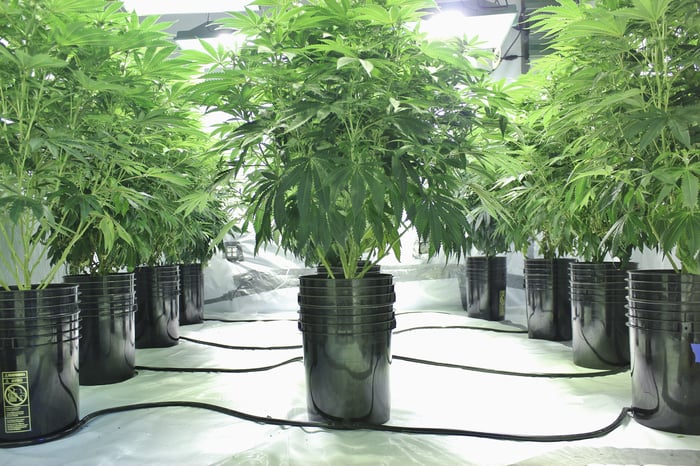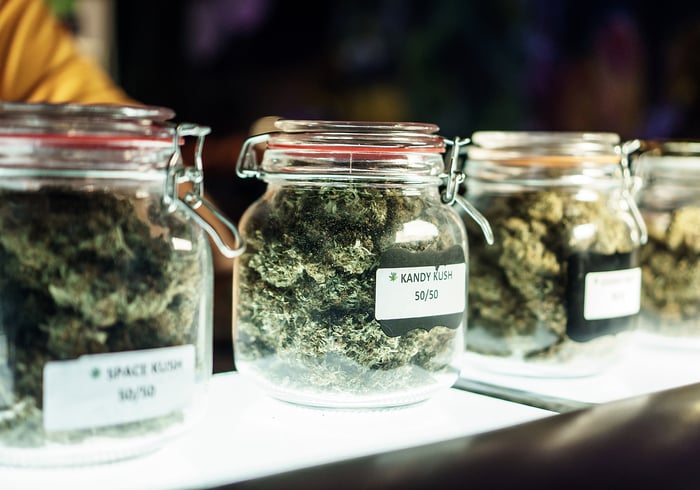The marijuana industry has had an historic, if not odd, year.
On one hand, the legal cannabis industry gained legitimacy with Canada choosing to legalize recreational marijuana in October. Although it's going to take a few years before growers are operating at peak potential, the legal weed industry could easily generate in the neighborhood of $5 billion in added annual sales by early next decade.
To boot, a handful of U.S. states voted to green light medical cannabis in the midterm elections, bringing the total number of medical pot states to 32. Vermont and Michigan also gave the OK to adult-use weed during the year, upping the total number of recreational weed states to 10.
On the other hand, marijuana stocks have performed abysmally in 2018. Despite a perfect storm of great news, many have lost a third of their value, if not more.

Image source: Getty Images.
These events defined CannTrust's 2018
One marijuana stock that's "outperformed" its peers, albeit is still down by a double-digit percentage year to date (through Dec. 7, 2018), is CannTrust Holdings (CNTTQ). CannTrust was up by more than 70% for the year in mid-October, but it has since given that back -- and some.
To better understand CannTrust's progress and perils, let's take a closer look at the four key events that defined its year.
1. The partial launch of the Niagara Greenhouse facility
Arguably the most exciting development for CannTrust was the opening of 450,000 square feet of hydroponic growing space at its flagship Niagara Greenhouse in late June. When complete, the Niagara Greenhouse will span just over 1 million square feet, with the second expansion, totaling roughly 600,000 square feet of grow space, expected to be complete sometime this month. Between its considerably smaller Vaughan facility and Niagara, CannTrust has the potential to hit more than 100,000 kilograms in peak annual production.
The Niagara facility is particularly intriguing because, as noted, it's a massive hydroponic grow farm. Hydroponics being the use of nutrient-rich water solvents as opposed to soil to grow cannabis plants. When combined with the company's moving containerized benches that create a steadier harvesting system (known as Perpetual Harvest by the company), CannTrust offers the ability to deliver steadier yield than its peers, along with lower-cost production.
CannTrust looks to be a few steps ahead of its competitors, at least on the capacity-expansion front.

Image source: Getty Images.
2. Four recreational brands introduced
Another interesting development that investors have witnessed in the latter half of 2018 is a move away from aggressive capacity expansion throughout the industry and toward brand development. This is something CannTrust has taken to heart.
In May, CannTrust announced its intention to launch three of what would be four recreational marijuana brands in 2018. The brands -- Liiv, Synr.g, and Xscape -- are focused on creating an emotional connection with the consumer, which'll become more important as dispensaries become crowded with product. Synr.g and Xscape are offered as dried flower and pre-rolled cannabis joints, with Liiv comprised of dried flower, pre-rolled joints, oils, and capsules. These brands officially launched in October.
Then, a day after announcing the launch of these three recreational weed brands, the company introduced its fourth brand, known as Peak Leaf. This is a brand targeted at consumers in British Columbia that's available in dried cannabis flower and pre-rolled joints.
The simple point is that CannTrust is doing an admirable job of differentiating its brands in what could be a crowded marketplace.

Image source: Getty Images.
3. A push into alternative sales channels
A third defining moment is CannTrust's move away from a sole reliance on dried cannabis flower and toward alternative products and sales channels.
For example, on April 18, CannTrust announced that it was entering into a partnership with Grey Wolf Animal Health to explore and develop cannabis-based products that could support and improve the well-being of pets. The impact of cannabis-based products on domestic pets is largely unknown, but Americans will spend an estimated $18.3 billion on veterinary care, and $15.5 billion on supplies and over-the-counter medicine in 2018, according to the American Pet Products Association, to ensure the health of their pets.
Also on April 18, CannTrust announced its intent to launch a new line of vegan-based hard-shell capsules. Cannabis oil is a higher-price, higher-margin product relative to dried cannabis flower, so the more consumers the company can attract with its oil products, the better chance it has of turning a profit.
4. The appointment of a new CEO
Lastly, investors' nerves were a bit rattled when, less than three weeks prior to the launch of recreational cannabis in Canada, Eric Paul stepped down as CEO. Paul is a co-founder for CannTrust and had manned the ship since its inception, so to see him depart this close to the official launch of adult-use products was odd. However, Paul was named chairman of CannTrust's board, so it's not as if he stepped aside completely.
Replacing Paul is Peter Aceto, the now-former president and CEO of ING Direct. It's a mixed move, with CannTrust choosing to bring in an individual with extensive knowledge of managing a business, but with virtually no knowledge of the cannabis industry.

Image source: Getty Images.
The big question
Of course, the big question is this: Should CannTrust be on your buy list in 2019?
While I remain skeptical of most marijuana stock valuations heading into the new year, CannTrust is certainly toward the bottom of my worries. In fact, with its focus on hydroponics and its steadier production potential, it could be a low-cost leader among the top-10 producers by peak output.
What I'll be looking for in 2019 is whether the industry can generate recurring profits on an operating basis. In essence, if we strip out a number of one-time fair-value adjustments, derivative gains, and asset sales, can these pot growers make money after subtracting operating expenses from gross profit? My suspicion is that CannTrust might be one of a select few growers to be able to make this claim by the end of next year. That makes it a marijuana stock that may be worth a look.





